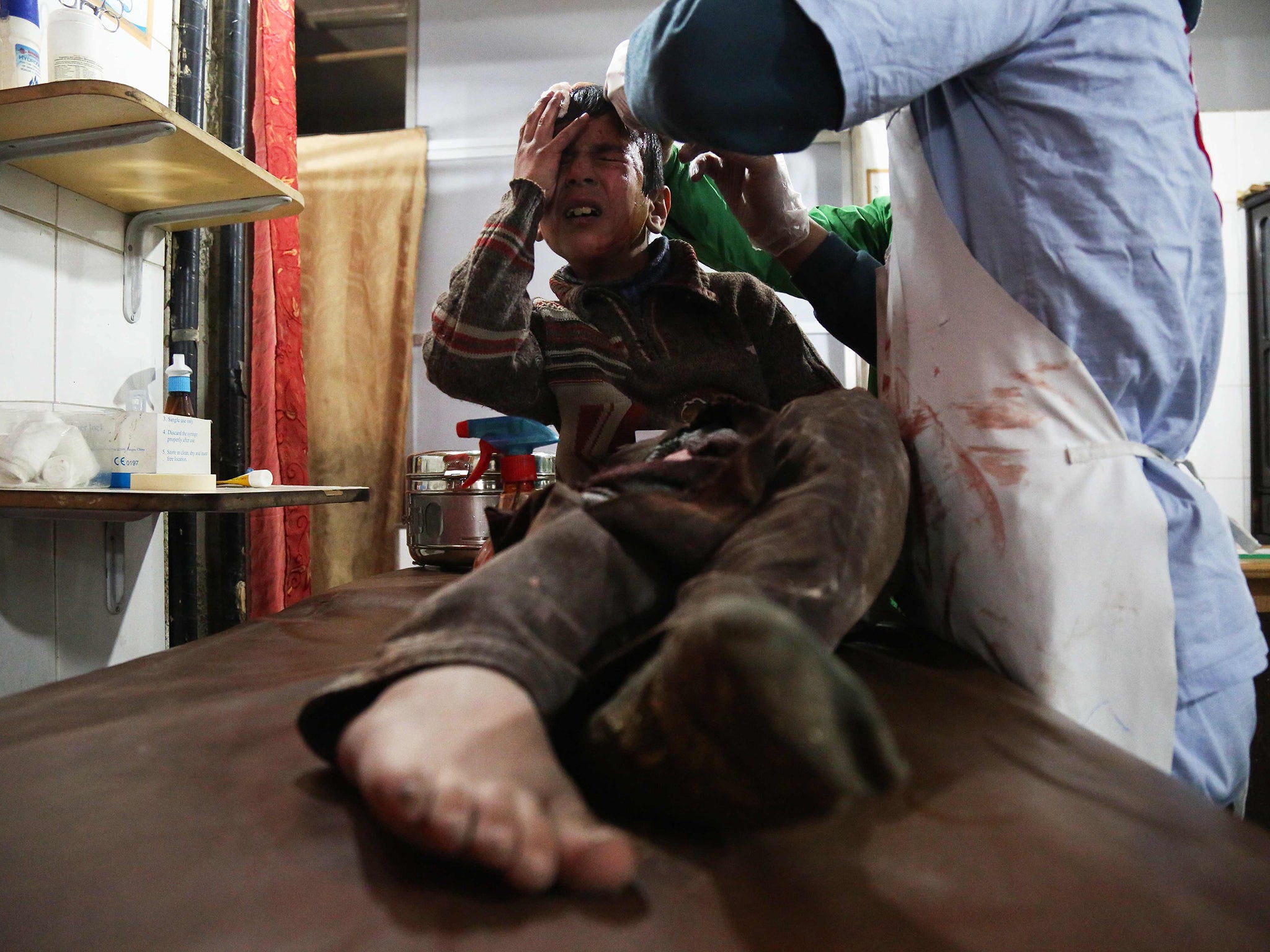The West stands impotent in the face of Syria’s Ghouta massacre
It is difficult to see, beyond diplomacy and sanctions, what the West can do about the massacres

Your support helps us to tell the story
From reproductive rights to climate change to Big Tech, The Independent is on the ground when the story is developing. Whether it's investigating the financials of Elon Musk's pro-Trump PAC or producing our latest documentary, 'The A Word', which shines a light on the American women fighting for reproductive rights, we know how important it is to parse out the facts from the messaging.
At such a critical moment in US history, we need reporters on the ground. Your donation allows us to keep sending journalists to speak to both sides of the story.
The Independent is trusted by Americans across the entire political spectrum. And unlike many other quality news outlets, we choose not to lock Americans out of our reporting and analysis with paywalls. We believe quality journalism should be available to everyone, paid for by those who can afford it.
Your support makes all the difference.While it is difficult to say who will be the winner in the three-cornered fight between Turkish, Kurdish and Syrian-regime militias in the enclave of Afrin, it is quite apparent who the losers are. As ever in this pitiless, apparently endless slaughter it is the innocent civilian population, their lives, their health and their human rights, who suffer most grievously. Once again the world is faced with incomprehensible horrors, and the West with few options at its disposal; after all, intervention on strategic or humanitarian grounds has had a mixed record across Afghanistan, Iraq, Libya and Syria already.
That is the first and central fact about the fate of this nominal province of Syria. By the end of the fight, again as with so many other battles, there will be a victory of sorts, the triumph of the graveyard, where someone will, for a time, hoist some banner over a pile of rubble and declare “liberation”. The Kurds, again following the pattern of history, have few friends they can rely on, their national homeland divided as it is across Turkey, Syria and Iran, their claim to an independent Kurdistan opposed by all three. In that at least they are united.
The battle for Afrin may have its unusual aspects, but it is also part of wearily familiar pattern. Syria has become a set of interlocking proxy wars between the superpowers, America and Russia, and between the shifting alliances of the regional powers Turkey, Iran and Saudi Arabia. With the exception of the Kurds, each and every faction at war in the region has its links to one of these, sometimes switching sides, with a supply of arms and ammunition and money that is as unstinting as it is amoral. Religious, tribal and racial divisions are ruthlessly exploited. At the end of it, more than in most conflicts, what is left is hardly worth having and every side suffers.
The danger is that the so-far proxy nature of the war starts to slide into direct confrontation. We have already seen US-supplied anti-aircraft artillery bring down a Russian-made jet, and now we find Turkish national forces in contact with Iranian-backed Syrian militia. The obvious risk comes when the confrontations become more direct. Still, even when the Turks shot down a Russian jet two years ago, national interests soon defused an apparently fissile diplomatic atmosphere. In the curious dance of death they are undertaking, no one can be quite sure where Vladimir Putin and Recep Erdogan will end up after they have finished colluding in the carve up of the region.
Meantime, in the remaining rebel strongholds elsewhere in Syria, the regime is grinding its way towards what seems an inevitable victory, at least in theory, for President Assad and his friends in Tehran and Moscow. As in Afrin, and so many other places, the victims are overwhelmingly civilians, and in Afrin include children. At least 50 civilians have reportedly been killed in the latest Syrian government attacks on the besieged Eastern Ghouta region, near the capital Damascus. It is a wonder they have hung on so long. The longer they do, whatever the merits of their case, the suffering of the 400,000 people trapped there will continue to worsen, and the UN say the situation is spiralling out of control. One doctor there warned: “We are standing before the massacre of the 21st century. If the massacre of the 1990s was Srebrenica, and the massacres of the 1980s were Halabja and Sabra and Shatila, then Eastern Ghouta is the massacre of this century right now.”
Remote as it may seem to some European eyes, the past few summers and the million-strong Syrian refugee crisis have taught us some lessons about the costs of wars far away. The fighting may soon be over in Syria, but many more will flee the region for their safety before that happens, and those who have made it to Europe will face the reality that they have nothing, and sometimes no one, to go home to in Syria. It is difficult to see, beyond diplomacy and sanctions, what the West can do about the massacres. There is no more ground for optimism in Syria than when the conflict grew out of the Arab Spring, six blood-soaked years and half a million lives ago.
Join our commenting forum
Join thought-provoking conversations, follow other Independent readers and see their replies
Comments